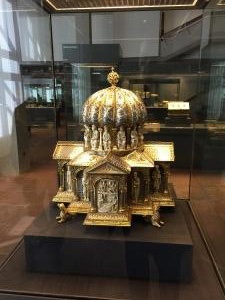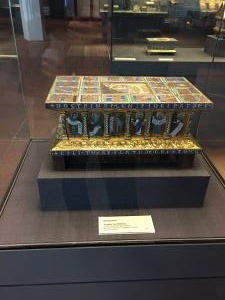Three New Members Are Added but German Museums Can Still Decline to Participate
After nearly a year of hinting at changes the Advisory Commission in Germany that makes recommendations to state museums on claims for allegedly Nazi-looted works in their collections (“Beratende Kommission im Zusammenhang mit der Rückgabe NS-verfolgungsbedingt entzogener Kulturgüter, insbesondere aus jüdischem Besitz,” or “Advisory Commission on the return of cultural property seized as a result of Nazi persecution, especially Jewish property”), the federal government announced last week the addition of three new members. Yet despite public outcry over the outdated and opaque procedures of the commission (better known as the Limbach Commission, in reference to the late Jutta Limbach, presiding member and former judge of the Constitutional Court), none of the fundamental flaws in the panel have been confronted or addressed. Instead, the occasion has served as little more than another photo opportunity for federal Minister of Culture Monika Grütters, whose visage dutifully accompanies all the recent announcements.
Read More
Topics:
Legislation,
Frankfurter Allgemeine Zeitung,
Stefan Koldehoff,
Beratende Kommission,
Gurlitt,
NS Raubkunst,
Restitution,
Bavarian State Paintings Collection,
Looted Art,
World War II,
Süddeutsche Zeitung,
Monika Grütters,
Limbach Commission,
Bayerische Staatsgemäldesammlungen,
Raphael Gross,
Gary Smith,
Marion Eckart-Hofer,
Simon Dubnow Institute,
American Academy in Berlin,
Rudiger Mahlo,
Jewish Claims Conference
We filed yesterday the opposition to the motion to dismiss my clients’ claims over the 1935 forced sale of the Guelph Treasure, or Welfenschatz. The motion was filed two months ago by defendants Germany and the Stiftung Preussischer Kulturbesitz. As we noted when Germany first moved to dismiss the complaint last fall, Germany’s arguments were revisionist and alarming in a number of troubling ways, most seriously because they tried to excuse persecution of Jews before an arbitrary date as an internal affair not subject to U.S. court jurisdiction, and because it repudiated Germany’s international commitments under the Washington Principles to address restitution claims on the merits. The abject failure of the Advisory Commission, which Germany tries to portray here as some sort of arbitration (which it is not) is also at the fore.


Read More
Topics:
Nazi-looted art,
Foreign Sovereign Immunities Act,
Advisory Commission,
Beratende Kommission,
FSIA,
NS Raubkunst,
Restitution,
World War II,
Welfenschatz,
Limbach Commission
Two days after suspending their participation in the Advisory Commission on the return of cultural property seized as a result of Nazi persecution, especially Jewish property, often called the "Limbach Commission" after its presiding member Jutta Limbach (the Beratende Kommission im Zusammenhang mit der Rückgabe NS-verfolgungsbedingt entzogenen Kulturguts, insbesondere aus jüdischem Besitz), the heirs of Alfred Flechtheim withdrew from the proceedings entirely. The dispute concerns Violon et encrier (Violin and Inkwell) (1913) by Juan Gris in the Stiftung Kunstsammlung Nordrhein-Westfalen (Art Collections Foundation of North Rhine-Westphalia) in Düsseldorf.
Read More
Topics:
Alfred Flechtheim,
Nazi-looted art,
Advisory Commission,
Beratende Kommission,
Restitution,
Düsseldorf,
World War II,
Limbach Commission,
Dr. Michael Hulton,
Juan Gris
A conference was held last week at the Oskar Reinhart Museum in Winterthur, Switzerland, entitled “Fluchtgut: Geschichte, Recht und Moral” (Flight Goods: History, Law and Morality). The objective conference was described in its program as follows (my translation):
Read More
Topics:
Expressionist,
Esther Tisa Francini,
Allied Collecting Points,
Südkurier,
Auctions,
Florian Weiland,
Oskar Reinhart Museum,
Dresden,
Karl Schmidt-Rotluff,
Nazi-looted art,
Robert Graetz,
Buchholz Gallery,
German Advisory Commission for the Return of Cultu,
Winterthur,
Entartete Kunst,
Beratende Kommission,
Curt Valentin,
Restitution,
Melissa Müller,
Luzern,
Clara Levy,
Farm in Dangast,
Fluchtgut: Geschichte Recht und Moral,
Lucas Elmenhorst,
Luxembourg,
Looted Art,
World War II,
Lucerne,
Switzerland,
degenerate art,
Handelsblatt,
Lost Lives Lost Art Jewish Collectors Nazi Art The,
Galerie Fischer,
Imke Gielen,
Washingtoner Prinzipien,
Jutta Limbach,
Washington Principles,
Drei Grazien,
Flight Goods: History Law and Morality,
Lovis Corinth,
Monika Tatzkow,
Three Graces,
Bavarian State Painting Collections,
Raubkunst,
Hans Posse,
Limbach Commission,
Bayerische Staatsgemäldesammlungen

The German Advisory Commission for the Return of Cultural Property Seized as a Result of Nazi Persecution, Especially Jewish Property (Beratende Kommission) has issued its latest decision concerning allegedly Nazi-looted art in German museums. For the second case in a row after the widely (and wisely) derided opinion not to restitute the Welfenschatz or Guelph Treasure at the Stiftung Preussischer Kulturbesitz in Berlin, the commission (known for its presiding member, former German Supreme Constitutional Court judge Jutta Limbach) has recommended against restitution, this time over the claim by heirs of Clara Levy to The Three Graces (Drei Grazien) by Lovis Corinth (1902/1904). The decision (available only in German) is riddled with poor logic and basic historical errors. In short, while it may be that the painting was indeed delivered to Clara Levy’s daughter in the United States at Clark’s express instruction, that is far less clear than the commission states, and its decision further makes a number of assumptions about the circumstances of Jews in occupied or about-to-be occupied territories that undermine its credibility considerably.
Read More
Topics:
Berlin,
Else Bergmann,
Schleifmühle,
Hildebrand Gurlitt,
Cornelius Gurlitt,
Ludwig Levy,
Fritz Levy,
Rita Hubbard,
Germany,
Nazi-looted art,
bill of lading,
Especially Jewish Property,
Buchholz Gallery,
Madame Soler,
German Advisory Commission for the Return of Cultu,
San Francisco,
Entartete Kunst,
Beratende Kommission,
Stiftung Preussischer Kulturbesitz,
FSIA,
Curt Valentin,
expropriation exception”,
Gurlitt,
Restitution,
Max Huggler,
Mendelssohn-Bartholdy,
Clara Levy,
Sigfried Rosengart,
Luxembourg,
Henry Zacharias,
Compagnie Generale Transatlantique Hol Lesquette,
World War II,
Foreign Sovereign Immunities,
Pinakothek der Moderne,
degenerate art,
beschlagnahmte Kunst,
Jutta Limbach,
Kunstmuseum Bern,
Drei Grazien,
Pablo Picasso,
Lovis Corinth,
Museums,
Three Graces,
Bavarian State Painting Collections,
Federal Republic of Germany,
Paula Levy,
Kurt Buchholz,
Welfenschatz,
Limbach Commission,
New York,
Bayerische Staatsgemäldesammlungen






